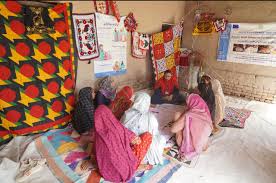EU boosts stability, resilience through WFP in Pakistan

Celina Ali
Islamabad: The European Union’s financial support, through the World Food Programme (WFP), has played a crucial role in helping flood-affected communities in Pakistan to recover and stabilize.
Over the course of 18 months, this partnership has focused on rebuilding lives, strengthening local communities, and preparing them for future challenges.
The United Nations World Food Programme (WFP) has completed its ‘Enhanced Food and Nutrition Security for Vulnerable People in Flood-affected Areas of Pakistan’ project, funded by the European Commission’s Service for Foreign Policy Instruments (FPI), this initiative aimed to support communities in Pakistan that were severely affected by flooding, said a press release.
For eighteen months, WFP supported the most vulnerable households in Pakistan’s worst flood-hit districts to facilitate early recovery, rehabilitation, and stabilisation.
The European Union contributed EUR 5 million to this effort, which helped transition from emergency relief to early recovery. The initiative used a community-based approach to not only provide immediate help but also reduce local tensions, promote cooperation, and encourage social unity. By forming village committees and ensuring that resources were distributed fairly, the project worked to rebuild infrastructure and strengthen livelihoods.
One key component was restoring important community assets, such as water systems, and promoting activities that generate income. This approach helped these communities become more resilient and better prepared for future challenges.
Through this EU-funded project, WFP provided direct assistance to more than 97,000 people and indirect support to 700,000 people across seven vulnerable districts in Balochistan, Khyber Pakhtunkhwa, and Sindh. More than USD 3.6 million in cash assistance was distributed, enabling participants to access nutritious food in exchange for their involvement in community asset creation and skills development activities.
The EU Ambassador to Pakistan Riina Kionka reaffirmed the EU’s dedication: “Community resilience is at the core of our efforts in Pakistan. The EU is proud to have contributed to building stronger, more resilient communities in the face of adversity by strengthening local capacities and fostering solidarity.”
Part of the project involved rehabilitation efforts that restored both physical and natural assets. This included the construction of 550 water management systems and 650 flood protection walls, which helped safeguard 76,000 acres of agricultural land and 40,000 homes. Additionally, 1,700 fuel-efficient stoves were distributed, and 10,000 trees were planted to reduce the environmental impact and provide future protection against climate-related disasters.
This project also delivered over 400 training sessions in marketable skills such as sewing, embroidery, dressmaking, and beautician services, as well as business management, digital marketing. Women constituted 80 per cent of the participants, whose income increased threefold from PKR 5,000 to PKR 15,000 (approximately USD 18 to 54), empowering them economically.
Coco Ushiyama, WFP’s Country Director in Pakistan, highlighted the importance of combining food security with resilience-building activities: “After major disasters like the 2022 floods, it’s critical to provide both immediate food assistance and long-term support. Thanks to the EU’s generosity, this project helped these communities become more resilient and food-secure.”
In addition to providing material and financial support, WFP, along with local experts from Rescue 1122 and Civil Defence, formed and trained 114 Community Emergency Response Teams (CERTs). These teams are equipped with essential rescue tools, making them better prepared to assist in future emergencies. This is a crucial step in ensuring that local communities can respond effectively to disasters when they occur.
Pakistan continues to deal with the impact of the devastating floods of 2022, which affected more than one-third of the country. WFP has been an essential partner in supporting nearly 4.4 million people since the flood crisis. The support has included a combination of immediate humanitarian aid, such as cash assistance for 1.7 million people in 2023, and longer-term efforts to build resilience and improve livelihoods.
Through this EU-supported project, many of Pakistan’s most vulnerable communities are now better equipped to face future challenges, from economic hardship to climate-related disasters. With improved infrastructure, stronger livelihoods, and enhanced emergency response capacities, these communities are on a more secure path to recovery.





